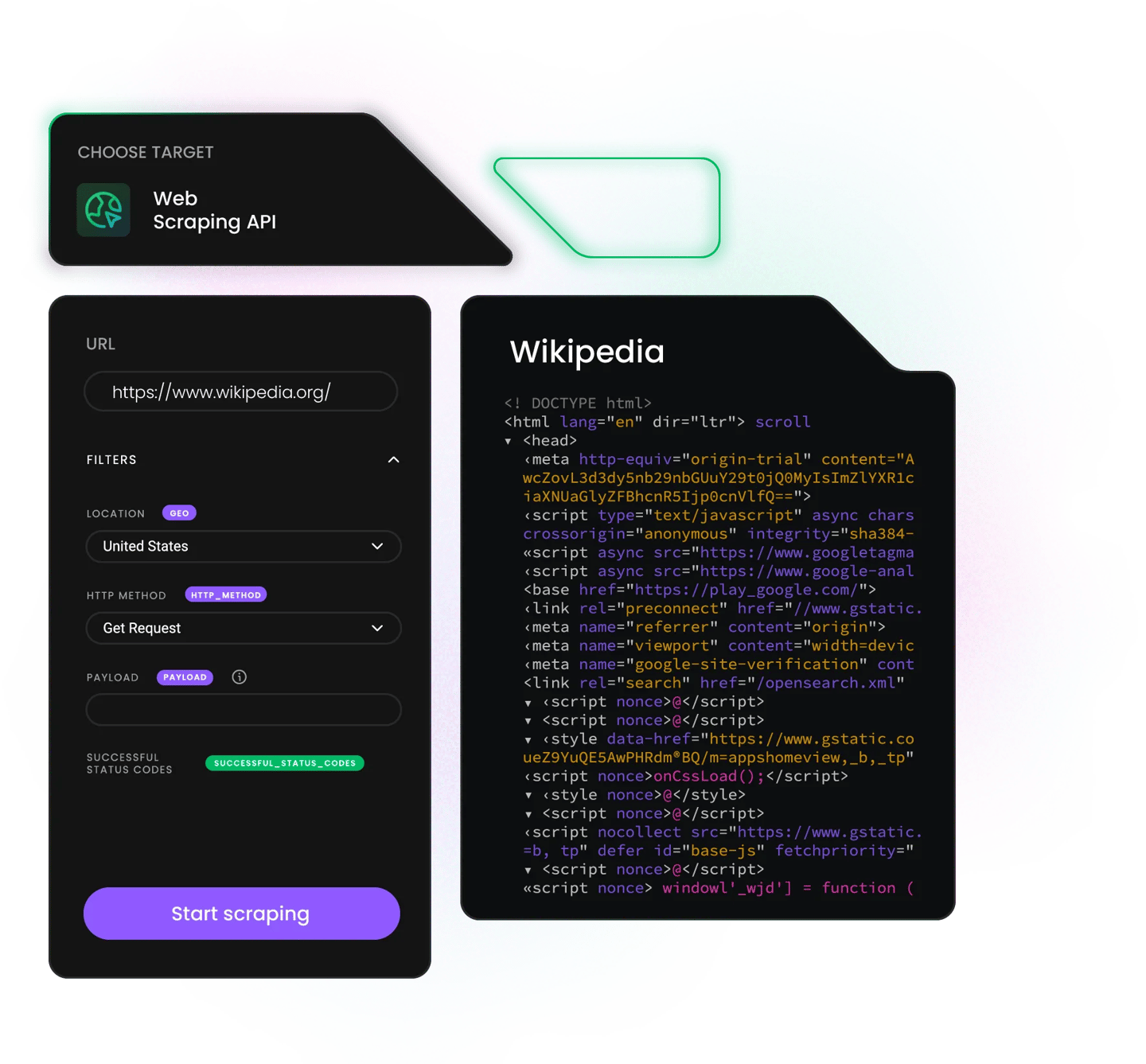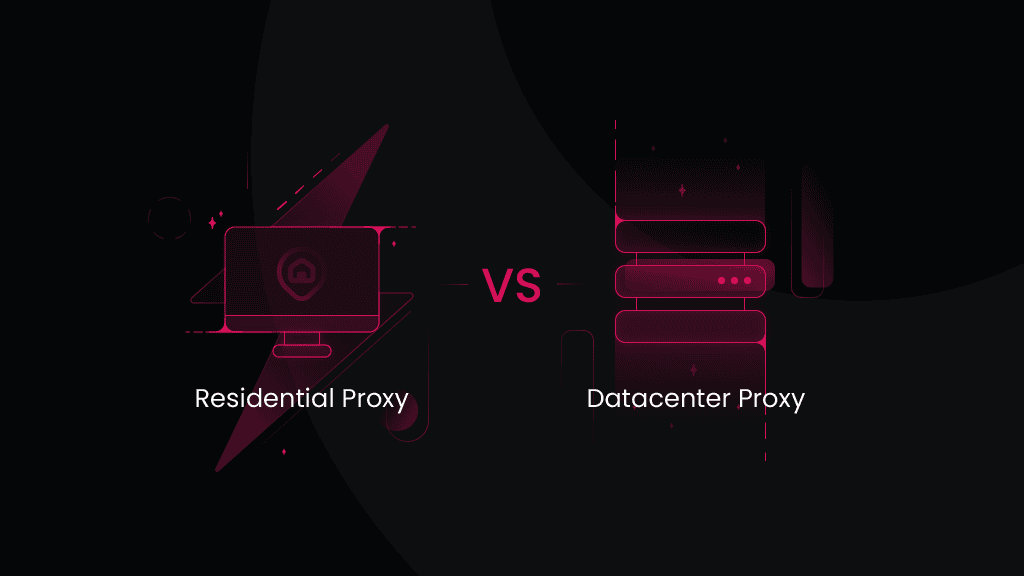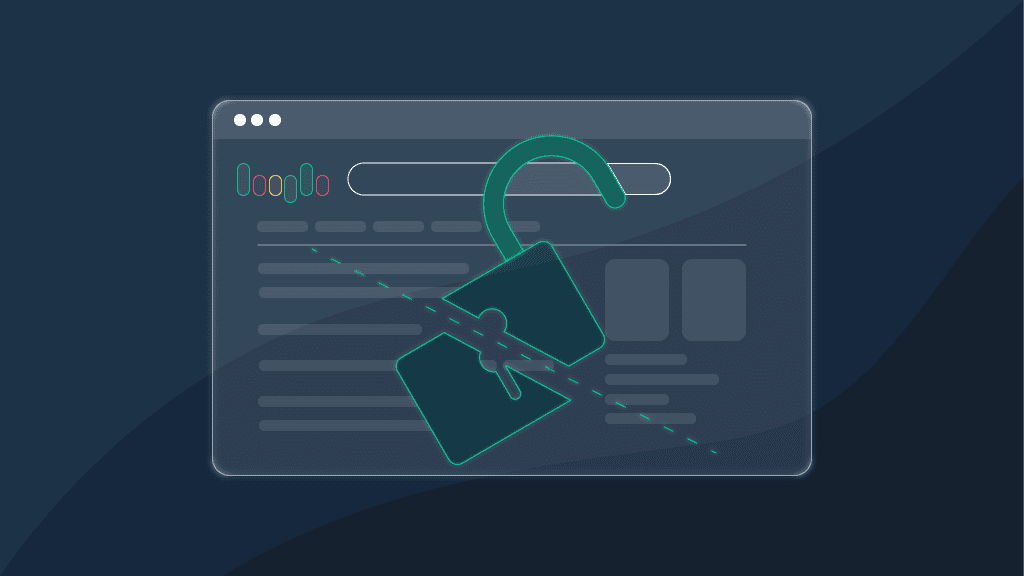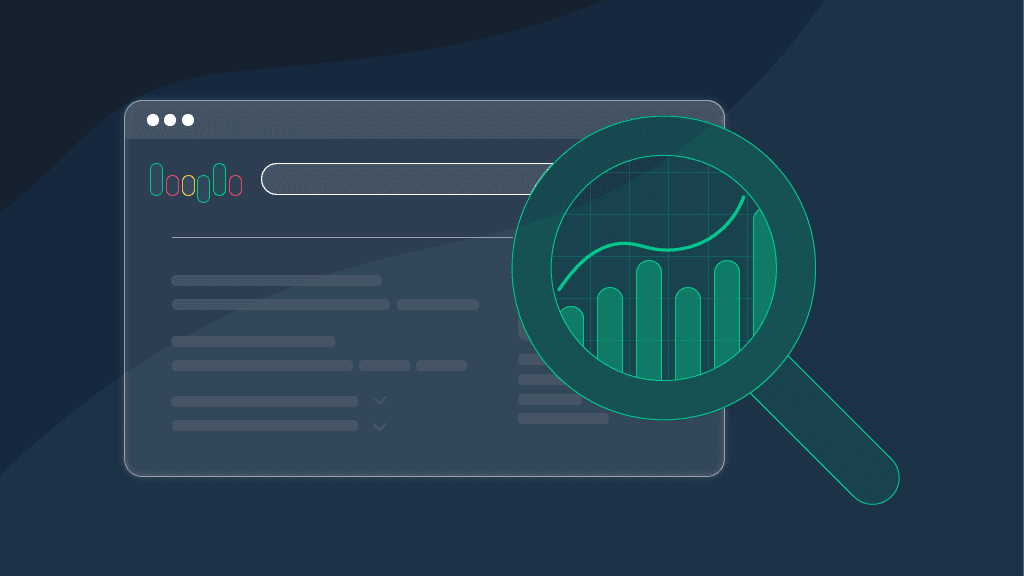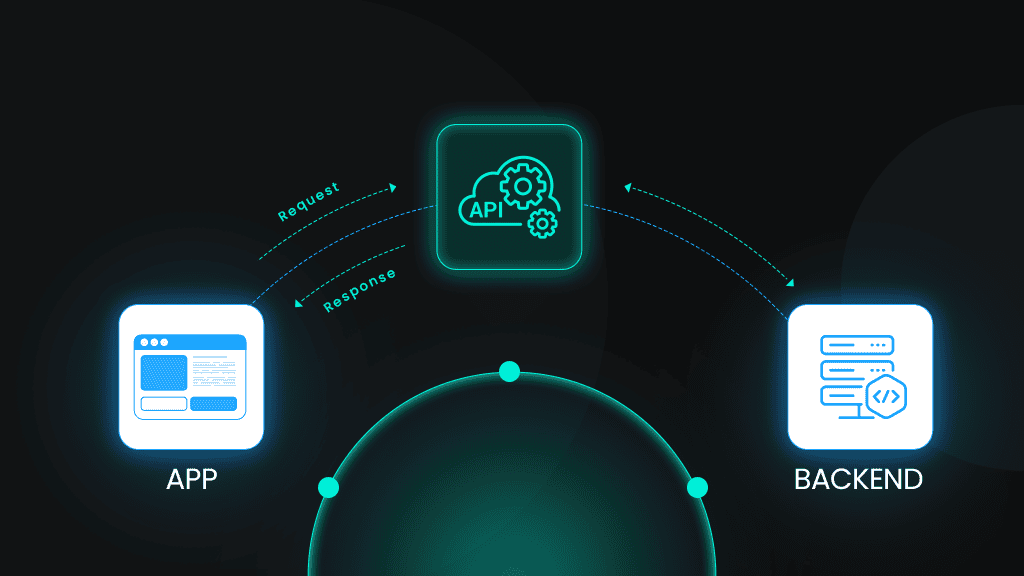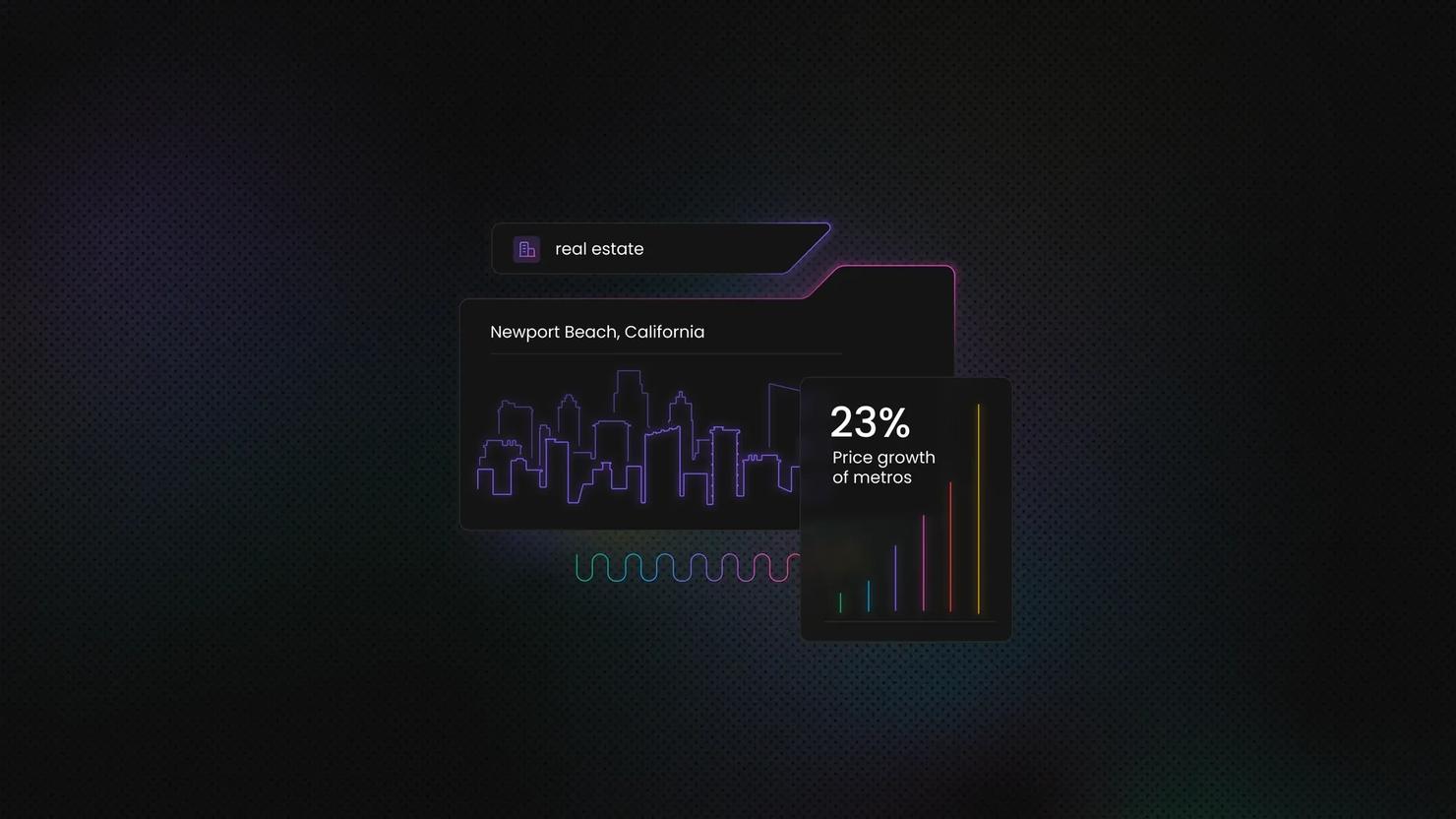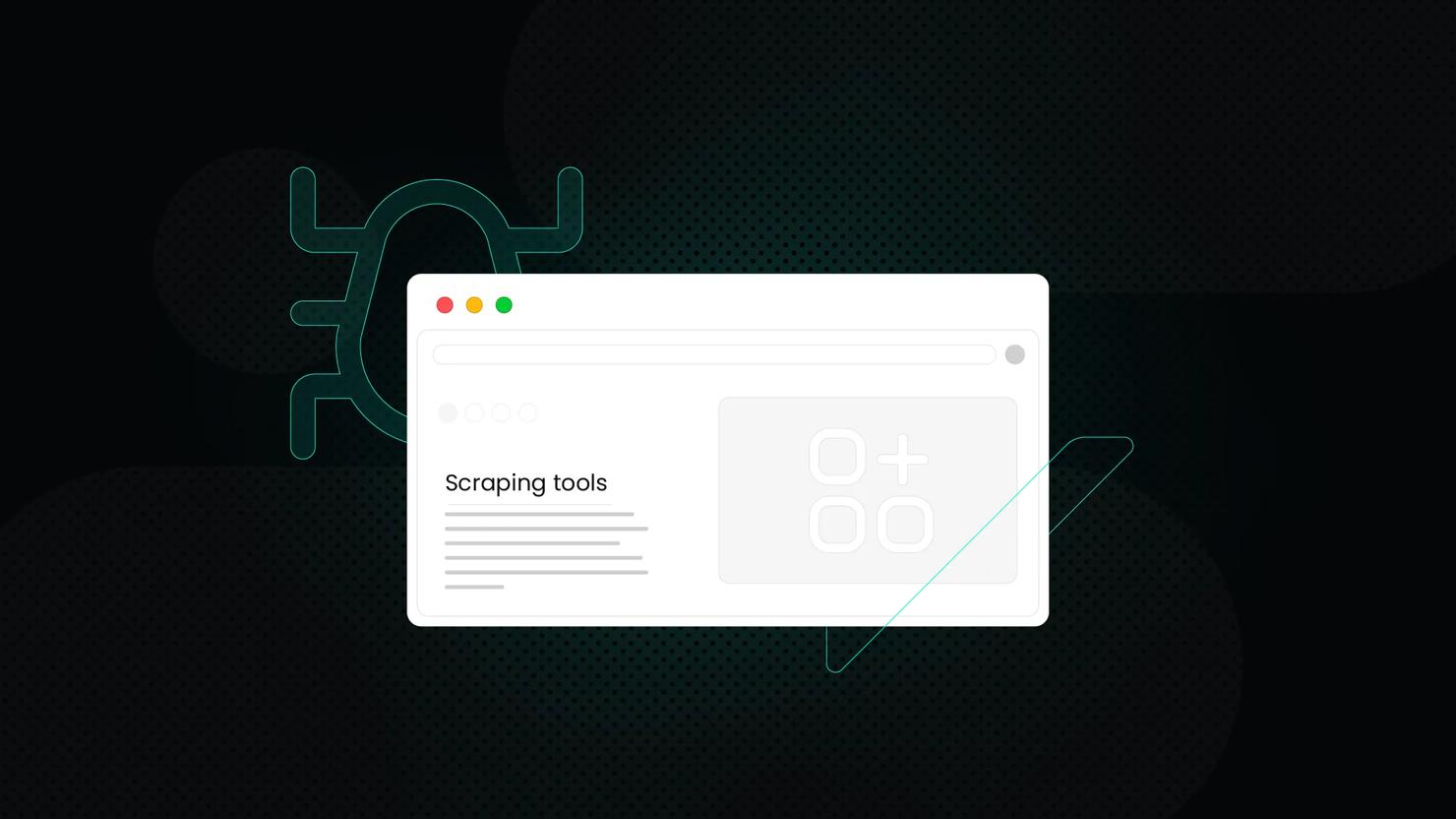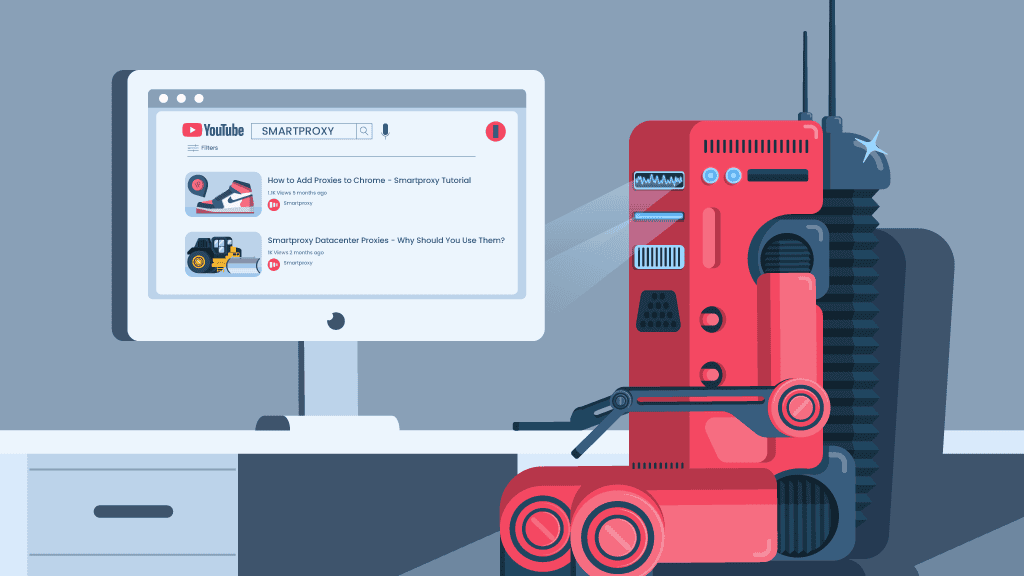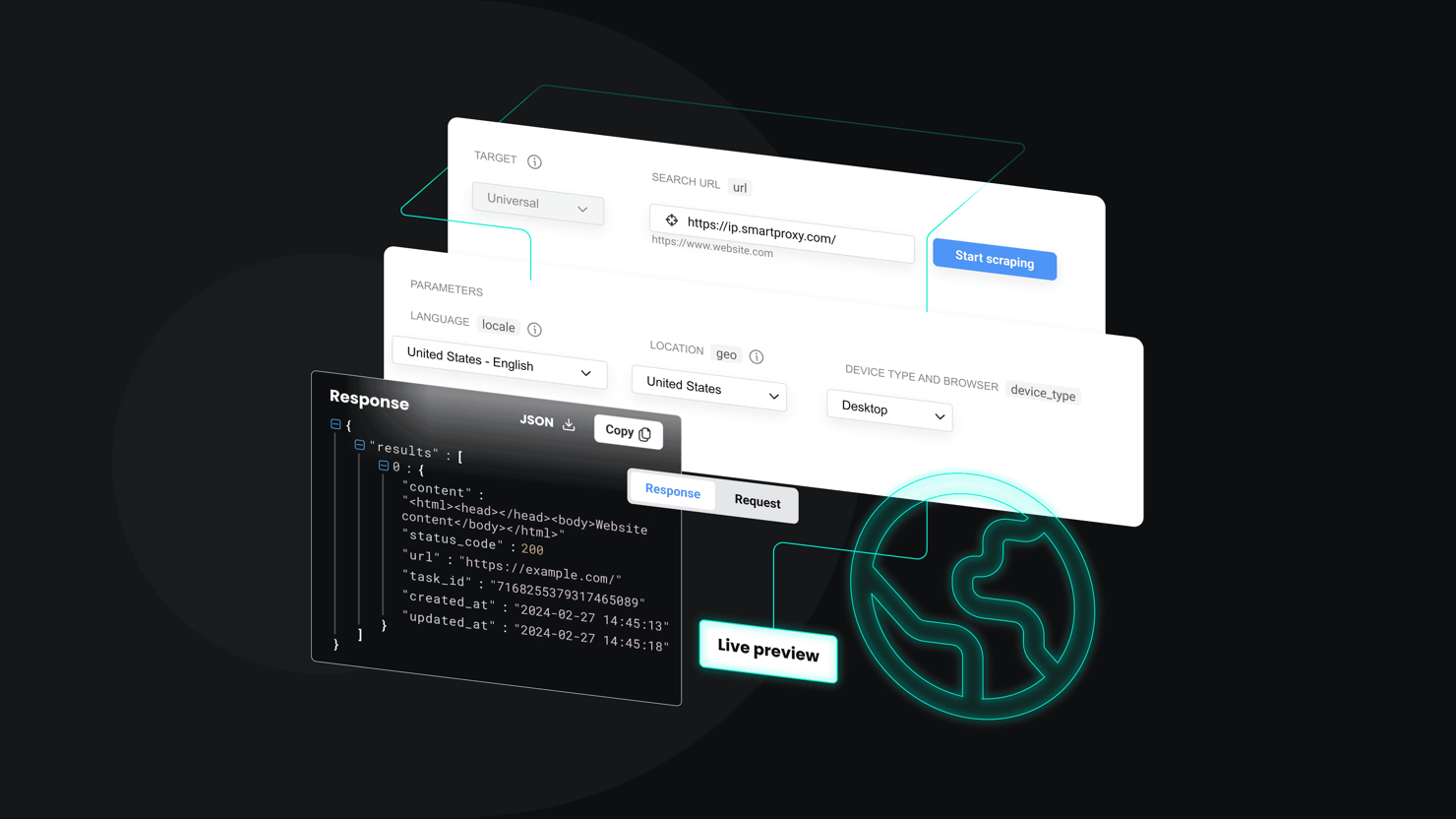Wikipedia Scraper API
Collect article content, infoboxes, citations, and more with our ready-to-use Wikipedia scraper API* – real-time results without CAPTCHAs, IP blocks, or setup hassles.
* This scraper is now a part of the Web Scraping API.
125M+
IPs worldwide
99.99%
success rate
200
requests per second
100+
ready-made templates
7-day
free trial
Be ahead of the Wikipedia scraping game
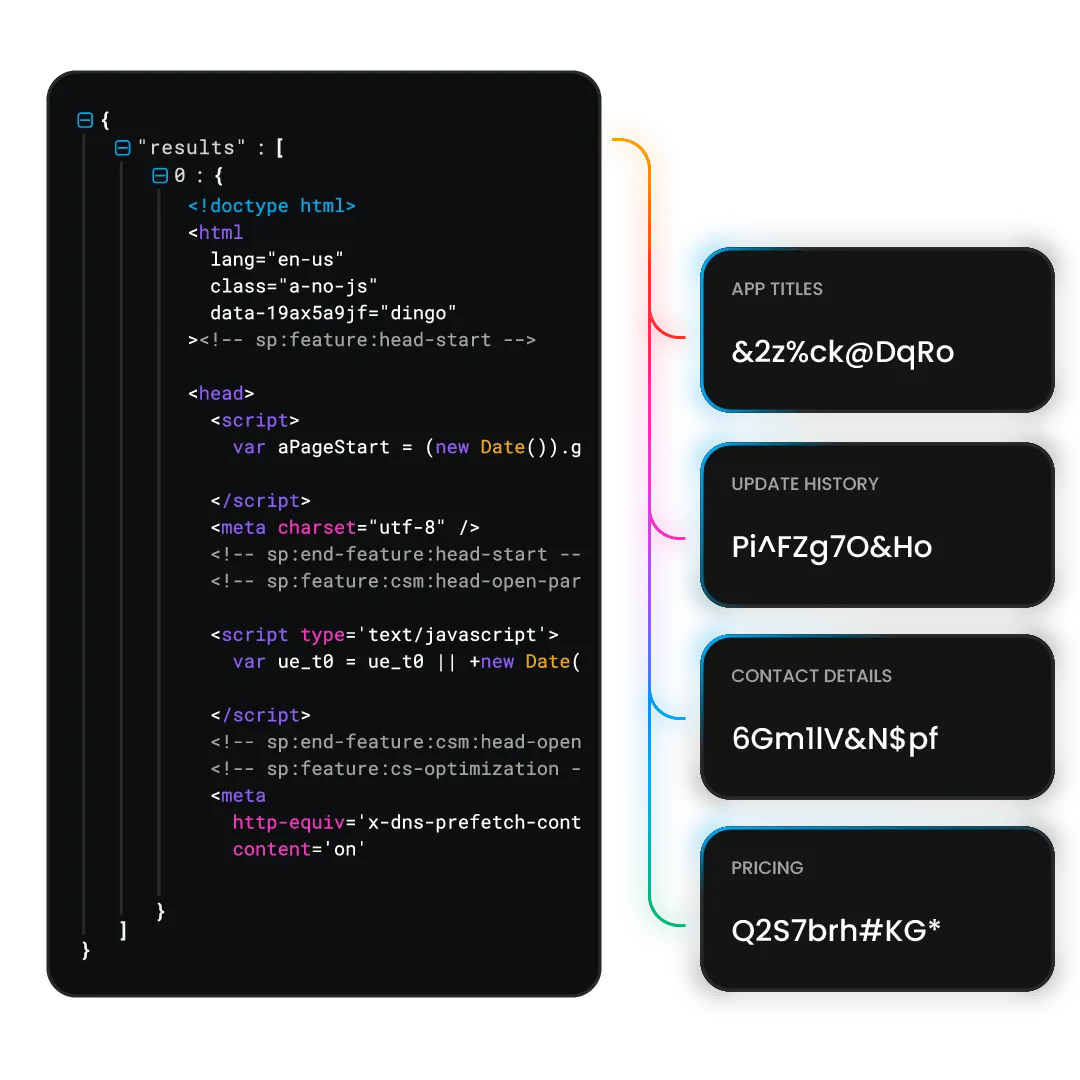
Extract data from Wikipedia
Web Scraping API is a powerful data collector that combines a web scraper and a pool of 125M+ residential, mobile, ISP, and datacenter proxies.
Here are some of the key data points you can extract with it:
- Article titles, summaries, and full content
- Infobox data (dates, locations, statistics)
- Internal and external links
- Categories and page hierarchies
- Tables, references, and citations
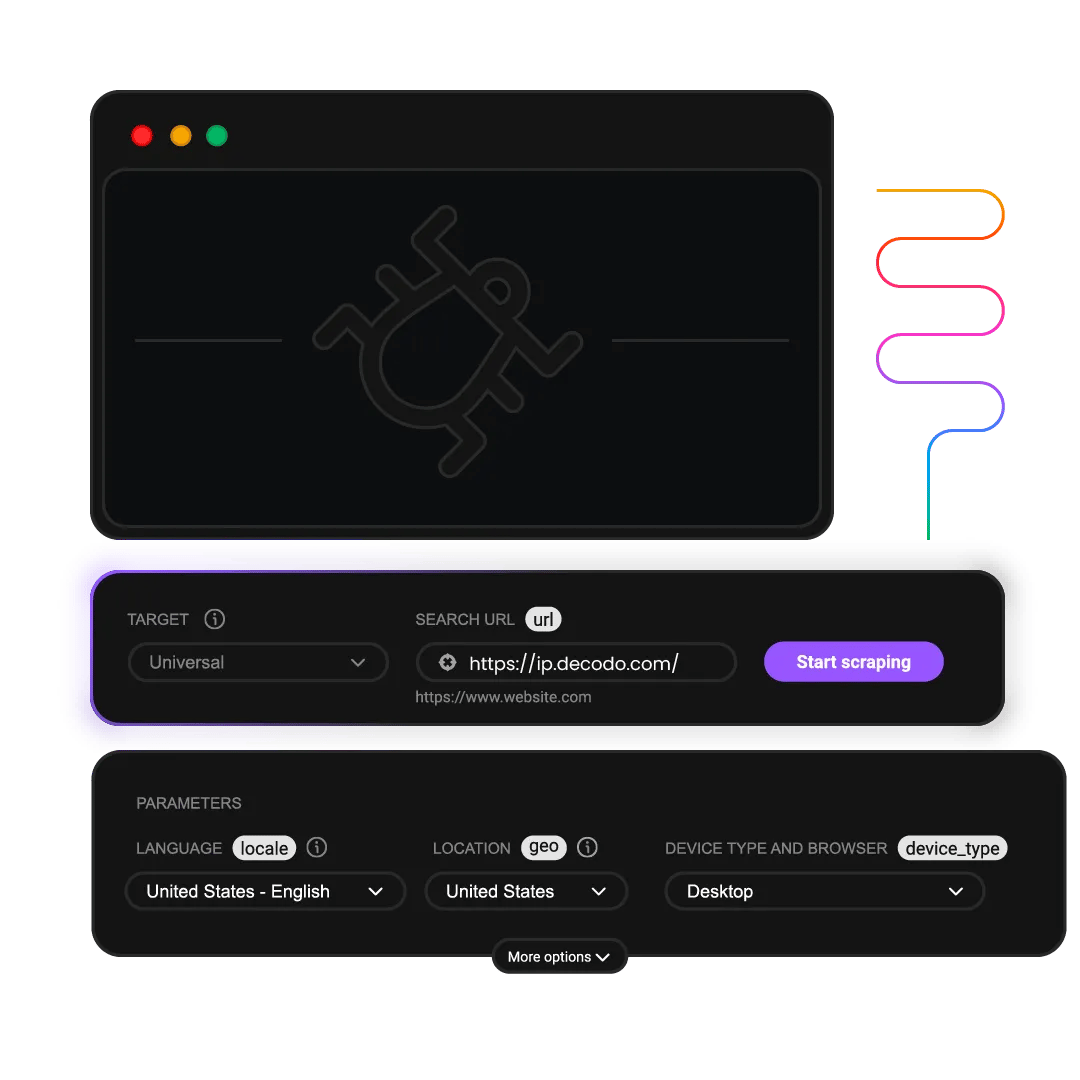
What is a Wikipedia scraper?
A Wikipedia scraper is a solution that extracts data from the Wikipedia website.
With our Web Scraping API, you can send a single API request and receive the data you need in HTML format. Even if a request fails, we’ll automatically retry until the data is delivered. You'll only pay for successful requests.
Designed by our experienced developers, this tool offers you a range of handy features:
Built-in scraper
JavaScript rendering
Easy API integration
195+ geo-locations, including country-, state-, and city-level targeting
No CAPTCHAs or IP blocks
Scrape Wikipedia with Python, Node.js, or cURL
Our Wikipedia Scraper API supports all popular programming languages for hassle-free integration with your business tools.
Unlock the full potential of Wikipedia scraper API
Scrape Wikipedia with ease using our powerful API. From JavaScript rendering to built-in proxy integration, we help you get the data you need without blocks or CAPTCHAs.
Flexible output options
Retrieve clean HTML results ready for your custom processing needs.
100% success
Get charged for the Wikipedia data you actually receive – no results means no costs.
Real-time or on-demand results
Decide when you want your data: scrape instantly, or schedule the request for later.
Advanced anti-bot measures
Use advanced browser fingerprinting to navigate around CAPTCHAs and detection systems.
Easy integration
Plug our Wikipedia scraper into your apps with quick start guides and code examples.
Proxy integration
Access data globally with 125M+ global IPs to dodge geo-blocks and IP bans.
API Playground
Run test requests instantly through our interactive API Playground available in the dashboard.
Find the right Wikipedia data scraping solution for you
Explore our Wikipedia scraper API offerings and choose the solution that suits you best – from Core scrapers to Advanced solutions.
Core
Advanced
Success rate
100%
100%
Payment
No. of requests
No. of requests
Advanced geo-targeting
US, CA, GB, DE, FR, NL, JP, RO
Worldwide
Requests per second
30+
Unlimited
API playground
Proxy management
Pre-build scraper
Anti-bot bypassing
Task scheduling
Premium proxy pool
Ready-made templates
JavaScript rendering
Explore our pricing plans for any Wikipedia scraping demand
Start collecting real-time data from Wikipedia and stay ahead of the competition.
23K requests
$1.25
$0.88
/1K req
Total:$20+ VAT billed monthly
Use discount code - SCRAPE30
82K requests
$1.2
$0.84
/1K req
Total:$69+ VAT billed monthly
Use discount code - SCRAPE30
216K requests
$1.15
$0.81
/1K req
Total:$179+ VAT billed monthly
Use discount code - SCRAPE30
455K requests
$1.1
$0.77
/1K req
Total:$349+ VAT billed monthly
Use discount code - SCRAPE30
950K requests
$1.05
$0.74
/1K req
Total:$699+ VAT billed monthly
Use discount code - SCRAPE30
2M requests
$1.0
$0.7
/1K req
Total:$1399+ VAT billed monthly
Use discount code - SCRAPE30
Need more?
Chat with us and we’ll find the best solution for you
With each plan, you access:
99.99% success rate
100+ pre-built templates
Supports search, pagination, and filtering
Results in HTML, JSON, or CSV
n8n integration
LLM-ready markdown format
MCP server
JavaScript rendering
24/7 tech support
14-day money-back
SSL Secure Payment
Your information is protected by 256-bit SSL
What people are saying about us
We're thrilled to have the support of our 130K+ clients and the industry's best
Attentive service
The professional expertise of the Decodo solution has significantly boosted our business growth while enhancing overall efficiency and effectiveness.
N
Novabeyond
Easy to get things done
Decodo provides great service with a simple setup and friendly support team.
R
RoiDynamic
A key to our work
Decodo enables us to develop and test applications in varied environments while supporting precise data collection for research and audience profiling.
C
Cybereg
Trusted by:
Decodo blog
Build knowledge on our solutions and improve your workflows with step-by-step guides, expert tips, and developer articles.
Most recent

Proxy Anonymity Levels: Transparent vs Anonymous vs Elite
Not all proxies actually protect your identity. Some proxies openly tell websites, "This request came through a proxy," while some can even leak your real IP if they're configured poorly. There are three proxy anonymity levels: transparent, anonymous, and elite. This article will walk you through each one, explain how they work, and help you choose the most suitable option for you.
Vytautas Savickas
Last updated: Feb 20, 2026
7 min read
Frequently asked questions
Is it legal to scrape data from Wikipedia?
Yes, scraping publicly available data from Wikipedia is generally legal as long as you comply with its Terms of Use and the Creative Commons Attribution-ShareAlike License (CC BY-SA 3.0). Wikipedia’s content is openly available for reuse, modification, and distribution, provided you give appropriate attribution, indicate any changes made, and maintain the same licensing.
We also recommend consulting a legal professional to ensure compliance with local data collection laws and the website’s Terms and Conditions.
What are the most common methods to scrape Wikipedia?
You can extract publicly available data from Wikipedia using a few methods. Depending on your technical knowledge, you can use:
- MediaWiki API – ideal for structured access to content like page summaries, categories, and revisions. Supports JSON output, rate-limited but reliable.
- Python libraries – use tools like wikipedia, wikitools, or mwclient to interact with Wikipedia’s API in an object-oriented way.
- HTML parsing with custom scripts – when the API doesn’t offer what you need (e.g., full page layout), fall back on tools like Beautiful Soup or Scrapy for direct scraping from the website.
- Page dumps – Wikimedia also provides full content dumps in XML or SQL format, best suited for offline analysis or large-scale data mining.
- All-in-one scraping API – tools like Decodo’s Web Scraping API help users to collect real-time data from Wikipedia with just a few clicks.
How can I scrape Wikipedia using Python?
Python is one of the most efficient languages for scraping Wikipedia thanks to its rich ecosystem of libraries. Here's how to get started:
- Using the Wikipedia API with the wikipedia library:
- Using Requests and BeautifulSoup for HTML parsing:
For large-scale or structured scraping, use Scrapy, which offers advanced control over crawling and data pipelines.
How do proxy servers help in scraping Wikipedia?
While Wikipedia is relatively open, proxy servers can still be useful when scraping at scale:
- Bypass IP rate limits – Wikipedia monitors request frequency per IP. Rotating proxies help distribute traffic.
- Avoid CAPTCHAs – though rare, some automated detection systems may present CAPTCHAs, proxies help reduce this risk.
- Geo-specific scraping – in some research scenarios, accessing localized versions of Wikipedia may require proxies from specific regions.
Why is Wikipedia a valuable source for data scraping?
Wikipedia is one of the most comprehensive, community-driven, and regularly updated encyclopedias on the internet. It’s valuable for:
- Research and academic studies
- Knowledge graphs and semantic search
- AI and LLMs training
- Market trend analysis
- Content enhancing
What are the benefits of using a Wikipedia scraper for businesses?
Businesses can leverage Wikipedia data for a wide range of use cases:
- Track emerging trends and brand mentions.
- Running market research.
- Enhance SEO strategy by discovering long-tail keywords and expanding topic coverage.
- Training machine learning algorithms and NLP models using high-quality textual data.
- Automatically enrich internal databases or chatbots with publicly available data.
- Enhancing content with publicly available information.
Wikipedia Scraper API for Your Data Needs
Gain access to real-time data at any scale without worrying about proxy setup or blocks.
14-day money-back option
